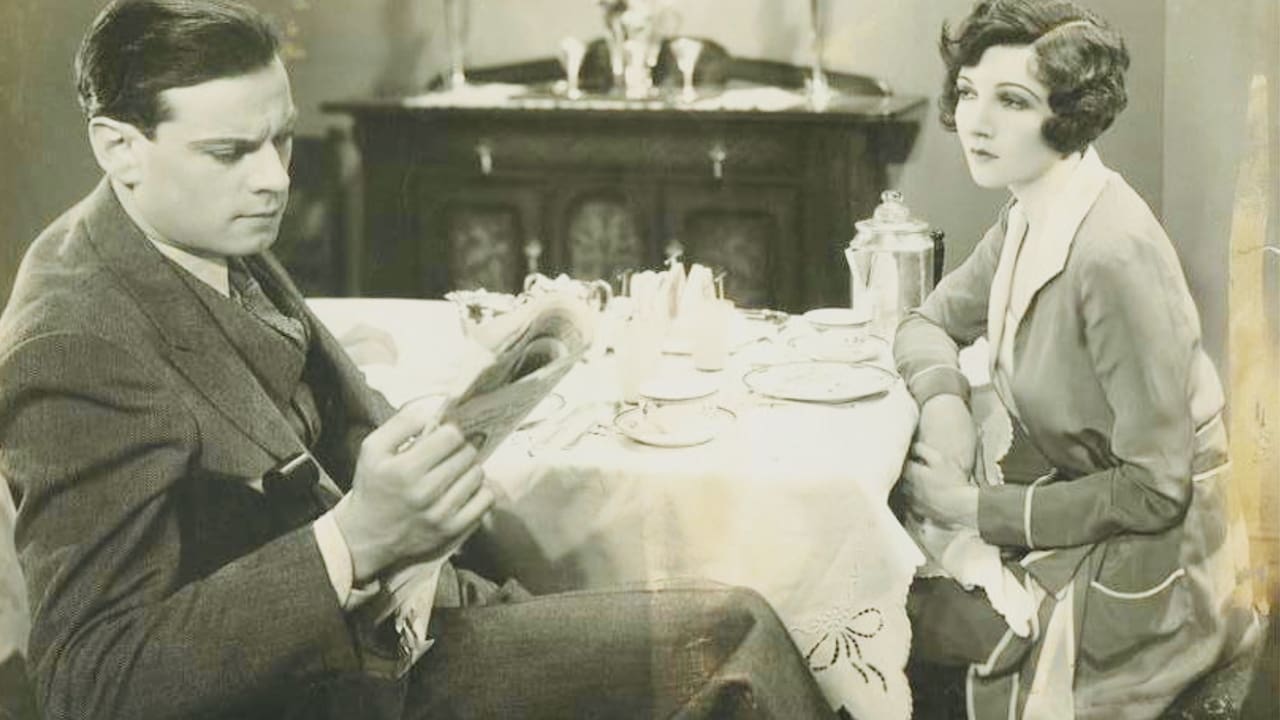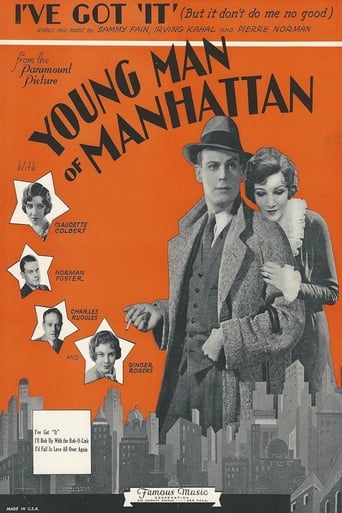

The same year that Ginger Rogers' leading part on Broadway in "Girl Crazy" was overshadowed by second lead Ethel Merman, she managed to steal the spotlight in this precode domestic drama from Claudette Colbert. Ginger did it with a Betty Boop voice and some amusing dialog, but a little bit of that goes a long way, and I'm glad her screen time is minimal. I'm also glad that this characterization only lasted a few films, because she never would have danced with Fred Astaire had she continued to sound as if she was constantly sniffing helium. Colbert and Norman Foster, married in real life, play a married couple, dealing with career goals that split them apart and various levels of stubbornness in both of them. He's constantly away covering sporting events (including that 30's dad, the six day bike ride) and this leads him to a flirtation with underage school girl Rogers. That part of the plot is creepy but Rogers (obviously a few years past 16) adds a bit of Lolita into her characterization, ironic considering the insinuations of that aspect of her character.For more humor, there's Charlie Ruggles as Foster's best pal who offers wisdom along with his wit. Colbert and Foster are sincere in their portrayals, while Rogers even gets a song. Her voice is light (which explains how Merman overshadowed her in "Girl Crazy") but sweet. If I had a nickel for everytime she called Foster "big boy", I'd be rich. Adding to the tension of Foster's stalking by Rogers, there's Leslie Watkins as Colbert's lecherous boss. Plenty of innuendo and flowing booze adds to the enjoyment of the pre-code elements. Not a great film by any means, this is a product of it's time, slow moving at times and often creaky. It also gives a warning to audiences of the time of the dangers of bootleg liquor with a horrifying plot twist that takes this to near tragedy. I just wish that Colbert and Rogers, two future Oscar winning actresses, got to share some scenes.
... View MoreMade at Paramount's Astoria Studio in New York, whose relatively primitive facilities took advantage of the talents that could be plucked from Broadway during the first few years of sound filming, Young Man of Manhattan gives us a marital drama about two newspaper writers, Norman Foster and Claudette Colbert (real life spouses at the time) during the latter parts of Prohibition. Marrying very quickly after meeting one another following the Tunney-Dempsey boxing match, they appear to take a rather flippant view of their marriage vows with Colbert proposing (discreetly) that they make it something of an 'open marriage', for after all, they're still quite young and what else can you expect?It's an attitude that doesn't survive the first flirtations as jealously rears its ugly head the first time that teenage flapper Puff Randolph (Ginger Rogers) slithers onto the scene and takes dead aim at Foster. Between Puff and her husband's drinking and his general childishness, Colbert soon has had enough. The plot takes a melodramatic turn that lessons somewhat what had been an interesting look into domestic life during the Roaring Twenties.Foster is the main figure and had a nice Pre-Code career before turning to direction, probably not a bad decision on his part as his general whininess prevented him from ever breaking through into real stardom. It served him well in this role, however. Perhaps the main points interest of Young Man of Manhattan today are the early roles provided for Claudette Colbert and Ginger Rogers (indeed, it's Ginger's first feature film, made by her at the age of eighteen). For Claudette it's a straight dramatic part, perhaps not her real strength but adequately accomplished here. Ginger, as well as Charlie Ruggles, serves as comic relief in a Baby Doll role which is right up her alley, and she does quite well with it as well as with a couple of short songs. As others have noted, she uses the Betty Boop style voice that would disappear once she got to Hollywood.The print of the film that I saw was in very poor shape. I wonder if anything better has survived?
... View MoreGinger Rogers had perfected a "baby talk" act when she was still a teenager as part of her charleston routine in vaudeville. Her mother wrote baby talk monologues for her and fashioned songs to be sung in a cute way - once the management of a theatre held her act over for 32 weeks and both mother and daughter were thrilled. The downside came when she was offered a part in a show, turned it down and watched in annoyance as Helen Kane, her substitute, became a national sensation doing the same sort of "babytalk" that Ginger had perfected. Ginger then had the good luck to be offered a role in "Top Speed" on Broadway and at the same time Paramount offered her the role of dizzy flapper "Puff" Randolph in "Young Man of Manhattan". Too easy, she filmed by day and danced and clowned by night!!!This was quite a familiar theme when the depression took hold - hard working girl taking slothful boy in hand to try to make him achieve what she knows he can!! Reporters Ann Vaughan (Claudette Colbert) and Toby McLean (Norman Foster) meet at the Gene Tunney Championship fight and it is love at first sight for Toby. He has ambitions and thrills Ann with his plans, he wants to get away from sport and become a feature writer. They marry but Ann finds out his ambition is just big talk - he is addicted to good times and the bottle but not to hard work!! She easily passes him on the ladder to success which makes him feel bad and he turns to boozy co-worker Shorty Ross (good old Charlie Ruggles) and the "adenoid infant" "Puff" Randolph, a dizzy school girl. With her insouciance and flip remarks like "Cigarette me, Big Boy" Toby thinks she would be a great subject for a feature article, which he intends to call "Portrait of a Gilded Child" but as usual he dillys and dallys and in the mean time Ann meets "Puff" and what do you think - she thinks "Puff" would make a good study as well!!! Before Ann can put paper in the typewriter she is promoted and whisked out to Hollywood to do a gossip column on the stars (strangely enough Paramount seems to dominate - I wonder why!!!) Toby senses Ann's disappointment in his work habits and with her absence starts to drink heavily and "Puff" who has a huge school girl crush on Toby, zooms in on the kill!!!Surprisingly, in my opinion, the highlight of the movie is when "Puff" sits down at the piano and for no particular reason in the story, does a baby talk version of "I've Got It But It Don't Do Me NO Good" and some fancy scatting to "Good 'N' Plenty". In those few minutes, it's easy to understand how, according to the critics of the day, she easily steals the movie from the main stars. Popular songs ("My Blue Heaven" etc) featured throughout the movie, courtesy of a neighbour's loud radio - this was during the time when studios were trying to incorporate music naturally into the movies without everyone stopping for a song and dance.The story takes a dramatic turn after this when Ann, home on a flying visit, takes a drink of liquor that Toby has left on the table and she is stricken blind. This seems to be just what Toby needs to prove his love - forsaking liquor he manages to write a serialized article and brings home the bacon - in this case $1,000, which manages to pay all the hospital expenses.Never have I seen Norman Foster more relaxed, it was probably because in real life he was married to Claudette Colbert who was, as always, excellent, especially when quipping "You don't know women - especially 16 year olds who think they're Greta Garbo"!!! Norman Foster just didn't seem to have the charisma to be a dynamic leading man, although Paramount certainly gave him enough chances in a diverse number of roles ("No Limit" (1931), "Confessions of a Co-Ed" (1931) etc) so it was a good thing when he took to directing.
... View MoreI know I'm second-guessing the author, but this movie is about a couple rather than one young man. In any case, it's a romantic comedy about a couple of newspaper reporters who meet at a boxing match and decide to get married shortly thereafter. Maybe too shortly, because marital problems ensue due to alcohol and money - a bad combination. The principals are Norman Foster and Claudette Colbert who were real-life man and wife at the time. I thought there should be more chemistry between the two as a result, but it was just enough to make the movie work. They get superb help throughout from Charles Ruggles, who was very funny and displayed impeccable comic timing and saved many a scene. Also in the cast, in her first full-length feature film, is Ginger Rogers, with dark hair and an irritating Betty Boop-type voice. She was almost unrecognizable at first glance.Foster's character is as a sportswriter, and there are some fascinating shots at Yankee Spring training camp in Florida with a look at Babe Ruth and a fleeting glimpse of Lou Gehrig. There is also some footage of the Dempsey-Tunney fight in 1927. On the whole, the film was good - I gave it a rating of six. I sometimes think that an old picture may have several worthy landmarks, mileposts and noteworthy appearances, but age alone does not make a good picture. Some relics are just old artifacts.
... View More